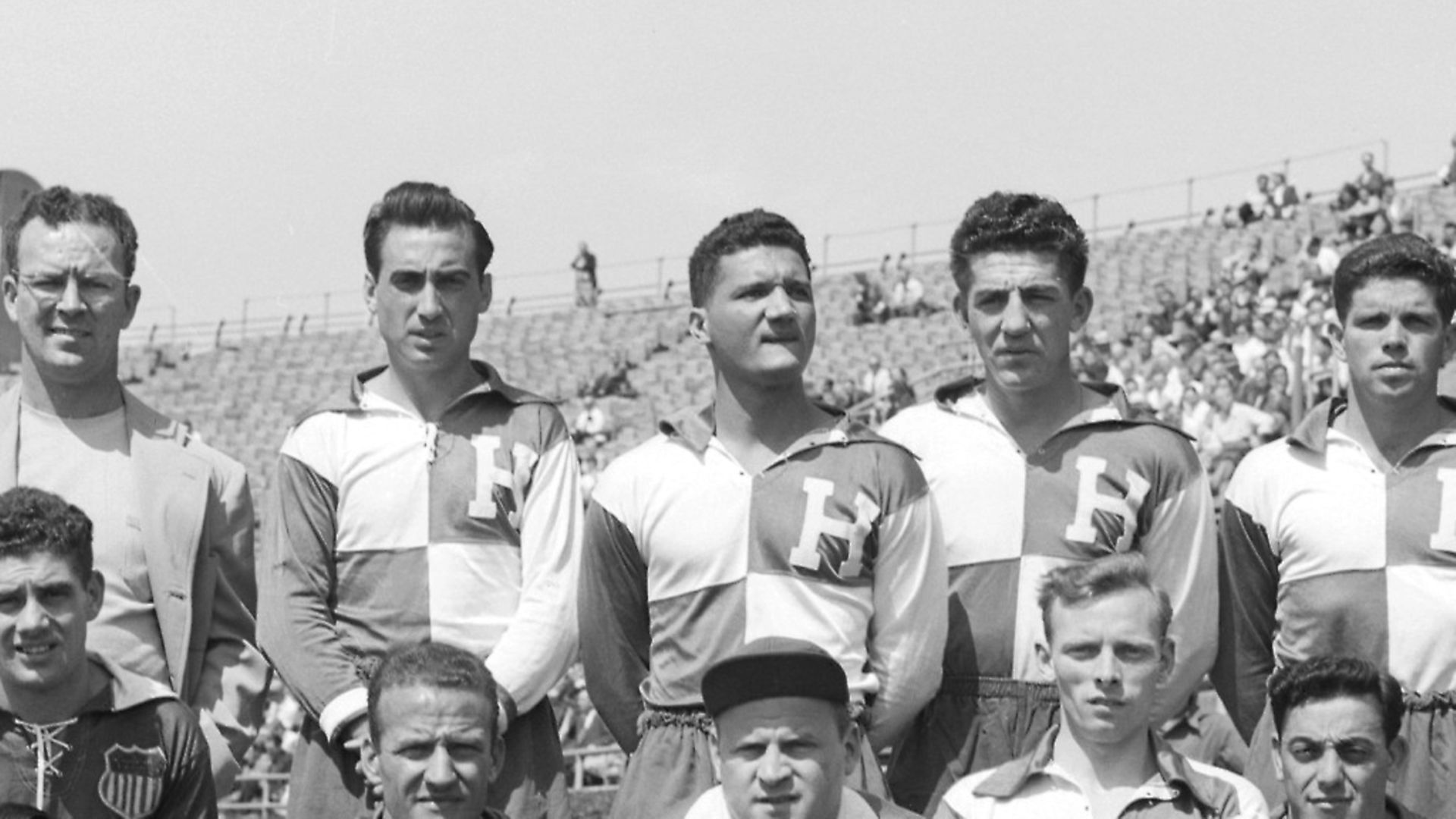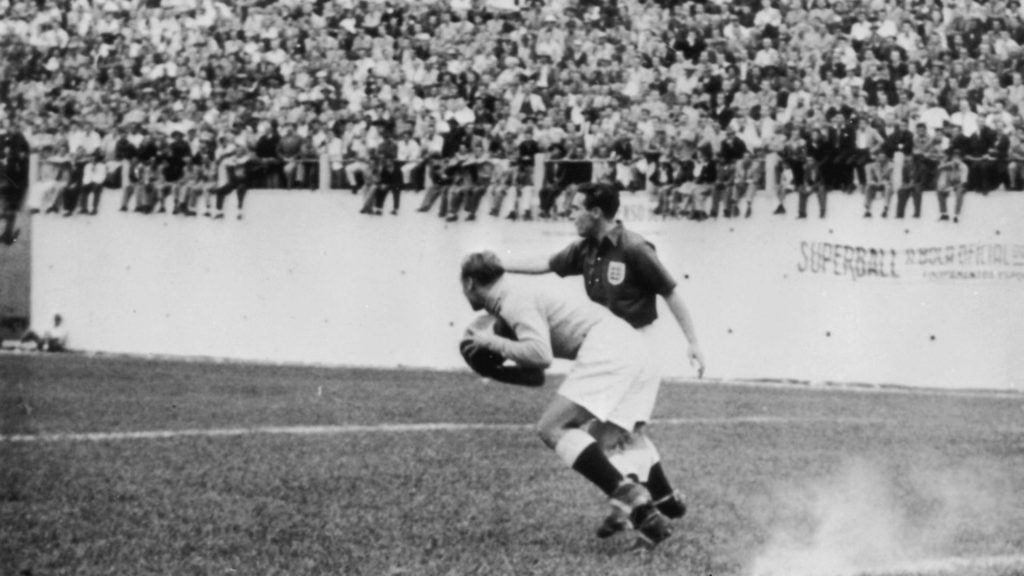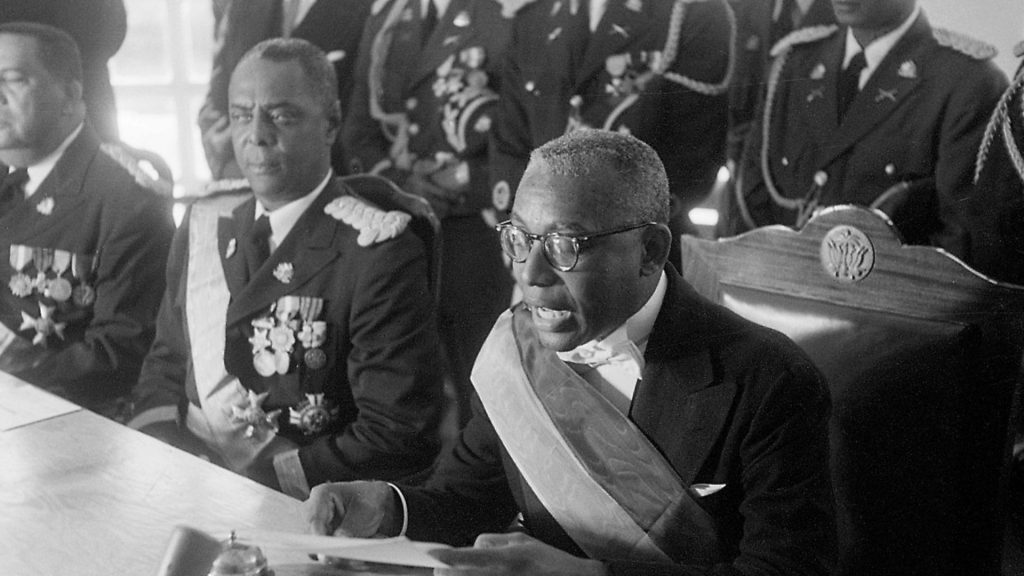
Seventy years ago this week Joe Gaetjens scored one of the most memorable goals of the 20th century before later suffering a brutal fate. WILL SIMPSON recounts the tragic story of a forgotten sporting hero

He was America’s first football hero.
Before Megan Rapinoe, before Clint Dempsey, Brad Friedel or any of the US players who have graced the Premier League there was Joe Gaetjens, an unassuming Haitian whose goal created what still is, arguably, the greatest upset in World Cup history.
Seventy years ago this week Gaetjens’ seemingly misdirected header beat England, the favourites for the 1950 World Cup, a team that in 78 years of international competition were still unbeaten at home by anyone outside the British Isles.
You would have thought such a feat would have warranted a ticker tape parade, a hero’s reception on his return. Instead Gaetjens’ feat caused barely a ripple. In his adopted land the result went almost completely unnoticed – only one US journalist was at the game.

Soccer in 1950 was a marginal sport, for migrants. Gaetjens himself was a recent arrival. He was born in Port-au-Prince in 1924 into what was, by Haitian standards, a comfortably middle class family – well, they lived in a two-storey house.
The Gaetjenses were a politically-engaged clan, except for Joe, whose world, from an early age, revolved around football. He had aspirations and like many ambitious Caribbeans looked northwards for a better life. His elder brother Gerard was already studying law in New York and so it was that in 1947 Joe joined him.
Life, as it often is for new migrants, was hard. In New York Gaetjens juggled college, a job in a restaurant washing dishes and football – he played for Brookhattan in the (amateur, of course) American Soccer League.
With the World Cup in Brazil coming up his goals for Brookhattan caught the eyes of the selectors, and his team-mates. Apparently, US captain Walter Bahr, on seeing him at the national team trials, commented: ‘This guy Gaetjens makes some of the most uncanny goals you ever saw.’ It was a perceptive observation.
The fact that Gaetjens hadn’t even sorted out his citizenship didn’t seem to matter. Qualification for the US team at the time only required that a player ‘declare an intent’ to become a citizen. The centre forward signed the required forms and he was off to Brazil.
In 1950 the phrase ‘there are no easy games in international football’ hadn’t begun to harden into cliché. The fact was that for a leading footballing power such as England they were still plentiful – coming into the tournament they had beaten current world champions Italy 4-0 and thumped Portugal 10-0.
In contrast the US had lost all seven of their last internationals, including defeats to Italy (7-1) and Northern Ireland (5-0) and a humiliating 11-0 loss to Norway.
Their line-up for the game in Belo Horizonte comprised just one professional player. The rest were a hodgepodge of carpenters, machinists, an interior decorator, a factory worker and of course, in Gaetjens, a dishwasher. It was widely assumed they would be cannon fodder, mere shooting practice for Finney, Matthews and co before the ‘kings of football’ (as the Brazilian press called them) moved on to the business end of the tournament.
Even the US manager Bill Jeffrey had described his team as ‘sheep ready to be slaughtered’ in the run up to the contest. He wasn’t engaging in Fergie-style mind games.
It was by all accounts an extraordinary match. In the first half England pulverised the US goal, but it was one of those strange games in which nothing connected.
Shot after shot either went wide or was saved by the US goalkeeper Frank Borghi, who put in the performance of his life. Then in the 37th minute the US attacked. Bahr drove a shot in from the right and Gaetjens got his head to it.
He didn’t make a true connection. But despite later reports (mostly in the English press) that it was a fluke deflection, those who knew Gaetjens suggest that this wasn’t the case; that it was another of his ‘uncanny’ goals.
Bahr would later describe Gaetjens as ‘as acrobatic’ as any forward he knew. ‘He would score impossible goals. If anyone else on our team had been in that position I would say most likely yes, it was an accident. But knowing Joe, it wasn’t.’
We’ll never know. There’s no television footage. There aren’t even any photographs of the goal – the press had camped themselves down at the other end, expecting (not without reason) an avalanche of goals in the US net.
Try as they might, in the second half England just could not equalise. One photo of that day features Gaetjens being hoisted aloft by his victorious team-mates. He looks happy, if a little bemused; perhaps not able to quite take in the enormity of what he and his team had achieved.
Disbelief was a common reaction to the result. The New York Times initially refused to print the scoreline, assuming that the wire report was a hoax. Some English newspapers presumed the same and erroneously printed the score as 10-1 in England’s favour. Others reported the scorer as ‘Larry Gaetjens’ where as the Associated Press recorded Ed Souza as having got the goal.
That goal should have been a springboard to a better life. But while Gaetjens did bag a move to Racing Club de Paris immediately after the tournament, any dreams of making it at one of France’s then-top clubs were swiftly curtailed when he was injured after four games.
He then dropped down to third division Olympique Alès but by 1953 had returned to Haiti where he was given a hero’s welcome at Port-au-Prince Airport with a banner proclaiming him ‘THE BEST PLAYER IN HAITI, THE USA and THE WHOLE WORLD’. He represented the country of his birth in a World Cup qualifier for the 1954 tournament, before injury forced him to retire at the age of 30.
Gaetjens had settled into a role as a coach and local celebrity when in 1957 life in Haiti took a turn for the worse. This was the year Francois ‘Papa Doc’ Duvalier won a dubious election victory.
Duvalier quickly snuffed out democracy in the country, forming the notorious Tontons Macoutes, a militia group that seized property, kidnapped and killed anyone they deemed to be an enemy of the regime. Their brutality became legendary and for the next 30 years Haiti, under Duvalier and after his death, his son Jean-Claude, aka ‘Baby Doc’, was a dictatorship with a population kept under a permanent state of terror.
Unfortunately for Gaetjens, his family had backed a rival candidate in the 1957 election. To make matters worse, after Duvalier made himself president for life in 1964 two of Joe’s brothers were said to be among a group of insurgents involved in a guerrilla campaign against the regime.
The whole family were now in danger. Friends advised Joe to leave the island. But the avowedly non-political Gaetjens refused, possibly believing his national treasure status would be enough to inoculate him against any reprisal.
Then one day in July 1964 the Tonton Macoutes turned up at the Gaetjens’ residence. Later, various stories abounded – that he had been shot, died in his cell of diarrhoea, even that Duvalier had stopped by the prison where he was held and killed him personally.
Whatever the truth, at just 40 America’s first footballing hero would never be seen alive again. Nobody in his adoptive country knew and few would have cared anyway.
The sadness is that if he had applied for and had his US citizenship accepted Duvalier would surely not have seized him for fear of causing a diplomatic incident.
It wasn’t until 1972 that his death was confirmed. By that time interest in soccer in the US had begun its initial period of growth. In the same year the centre forward was honoured in a benefit game between New York Cosmos and a team of local Haitians in the Yankee Stadium. In 1976 he was posthumously inducted into the US Soccer Hall of Fame.
In the years since, interest in Gaetjens has grown. In 1996 Geoffrey Douglas’s book The Game of Their Lives was published, which detailed the USA’s shock victory and 1950 World Cup campaign.
This later got made into a 2005 film, which embellished the legend to the point of containing a number of wild inaccuracies (including depicting Gaetjens as practicing voodoo when in fact he was a devout Catholic). These days if the US are represented at a major tournament you’re likely at some point to stumble across a Gaetjens replica shirt and, perhaps inevitably, sales of them spiked before the 2010 World Cup when the US played England in their opening game. (On this occasion, they drew 1-1.)
Football is now an established sport in the US and in the women’s game they are undisputed world leaders. But Joe Gaetjens’ story remains a tragic one, a man who was at the right place at the right time to make history, but whose moment of glory and death both came too soon.









